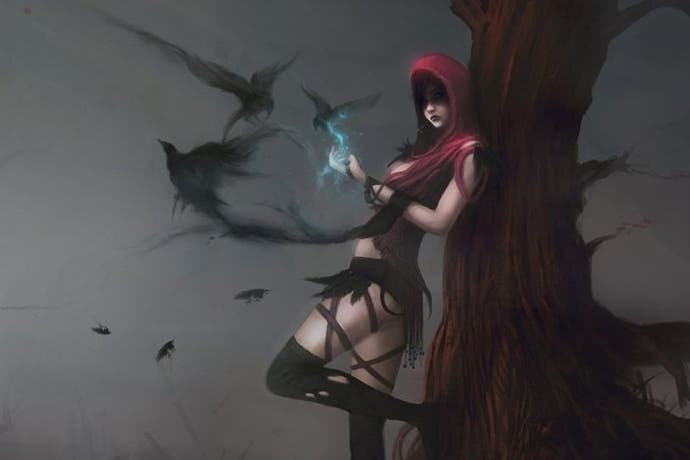The first draft of Dragon Age: Origins didn't even have Grey Wardens
And a narrator you thought was Flemeth turned out to be an old Morrigan.
When BioWare finished work on Star Wars: Knights of the Old Republic (2003) and second Neverwinter Nights expansion Hordes of the Underdark (2003), two separate teams began work on two separate new games. One was a science fiction game that would become Mass Effect, and one was a fantasy game that would become Dragon Age.
But Dragon Age back then was very different, key writer David Gaider told Canadian radio show 102.1 The Edge, in a lovely long post-mortem interview. Back then there weren't even darkspawn, which meant there were no Grey Wardens to fight them. "I didn't account for them in the world in that first draft," said Gaider.
Initially, there were mages, but their persecution was much more severe. "Initially my prohibitions on the mages were a lot more strict," said Gaider, remembering how you weren't even allowed to use magic in cities unless you had a "prescription" to do so. "The sentiment against mages was eventually supposed to be [that] somebody saying 'you're a mage' is like somebody saying 'you're a vampire'.
"We didn't really have a story," he added, "because I went and made a world and I tried to seed ... an interesting kind of conflict so it could be a game. But we didn't know the first game took place in Ferelden. That was not a thing."
He said Loghain, the villain (who I naturally saved and who joined me in Dragon Age: Inquisition), was probably the first character he wrote.
Today he feels Morrigan is the most iconic of DAO's characters. She's "the other", "the outsider", he said, the one who doesn't represent a facet of the world. And of course you can have a baby with her, a Dark Ritual that appeared "back when the initial plot was concepted". "Initially everyone could have a baby with Morrigan," he revealed, "even female players." And there was another version of that Ritual if you were in love with her or if you were her friend. But it was all stripped back because "we had so many pokers in the fire that we just couldn't fulfil all of them".
There was even an idea early on to have an old lady narrate the tale as though it happened to her many years ago. "There was a time when the origin story had a historical framing," he said. "It was being told as a story in the distance past by an old woman that you initially would have thought was Flemeth and at the end you realise is Morrigan many, many years later."
Dragon Age: Origins had six origin stories, which are two-hour prologues unique to each race and upbringing. Originally, however, there were 12 - "or something ridiculous". "We had a human commoner origin, sort of a Luke Skywalker beginning, where you were growing up on a farm and it got attacked by a darkspawn," he recalled. "And there was a barbarian origin where you played an Avvar. That one was weird but kind of interesting. Those were the two that went the furthest, that went past the concept stage."
Dragon Age: Origins came out in 2009, and of course today there are two other games in the series. But back then BioWare didn't know people would like the game, which is why the epilogue slides were somewhat hurriedly put together, and reached far into the future (a problem for continuity in later games). "Initially we [weren't] certain we would get a second game," he said. "Ideally we were hoping that we would put out Dragon Age: Origins and it would be successful. We didn't know.
"At the time maybe Dragon Age: Origins was going to have to live on its own as its own game. Jade Empire never got a sequel. So at the time it didn't seem so unrealistic to consider the fact that this might be our only shot at this one particular story."
How Dragon Age: Origins measures up against Dragon Age: Inquisition in terms of commercial success today is unclear. Weaker series instalment Dragon Age 2 sold more than 1m back in 2011, but beyond that numbers aren't available. EA said five years ago, in 2010, that DAO had sold 3.2m units, but hasn't said anything since. EA hasn't detailed any specific Inquisition figures whatsoever, but has said it was "the most successful launch in BioWare's history". That, however, does not mean it is the most successful BioWare game.
Dragon Age: Origins remains a game from another era - an ambitious 'let's invent our own role-playing universe' of an idea that spiralled into six years of development. "As we got more and more toward the end, the crunch became so incredible," Gaider recalled, "and things were getting cut left and right." And to him, from where he was sitting, what was released was a hodgepodge - a "hacked, slap-dashed thing covered in band aids" - that he thought would seem "terrible".
Far from it, Dave, far from it. Today Gaider has moved on from Dragon Age and onto BioWare's "new upcoming project", which hasn't been announced. Patrick Weekes will take over his lead writer role.


